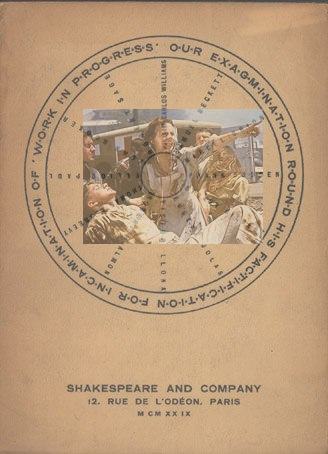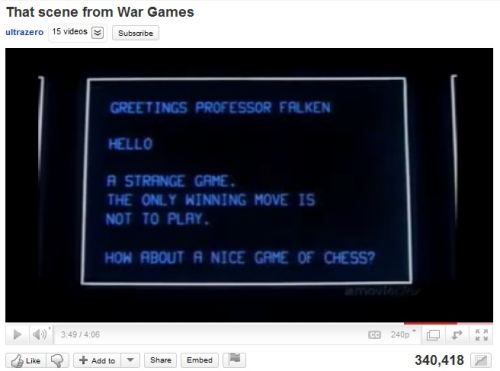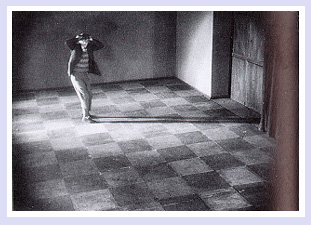|
CBS Sunday Morning today suggests a review of an old post featuring Pearl Jam. From that post . . . Mathematics and Narrative, continued… Out of What Chaos, a novel by Lee Oser— "This book is more or less what one would expect if Walker Percy wrote about a cynical rock musician who converts to Catholicism, and then Nabokov added some of his verbal pyrotechnics, and then Buster Keaton and the Marquis de Sade and Lionel Trilling inserted a few extra passages. It is a loving and yet appalled description of the underground music scene in the Pacific Northwest. And it is a convincing representation of someone very, very smart." "If Evelyn Waugh had lived amid the American Northwest rock music scene, he might have written a book like this." –Anonymous Amazon.com reviewer A possible source for Oser's title– "…Lytton Strachey described Pope's theme as 'civilization illumined by animosity; such was the passionate and complicated material from which he wove his patterns of balanced precision and polished clarity.' But out of what chaos did that clarity and precision come!" —Authors at Work, by Herman W. Liebert and Robert H. Taylor, New York, Grolier Club, 1957, p. 16 |
Sunday, September 22, 2024
Seattle Jam
Friday, February 5, 2021
Imagery
“As you read, watch for patterns. Pay special attention to
imagery that is geometric….” — “Pattern in The Defense”
Friday, September 4, 2020
Force Field of Dreams
(Continued from September 22, 2002.)
“As you read, watch for patterns. Pay special attention to
imagery that is geometric….” — “Pattern in The Defense “


See as well Wednesday’s Smile, and “Expanding the Spielraum“ .
Saturday, April 28, 2012
Play and Interplay
The last paragraph of the previous post
(as updated at about 7:20 PM today)
suggests a search for the phrase
"play and interplay" that yields…
"He had accepted the world as the world,
but now he was comprehending the
organization of it, the play and interplay
of force and matter."
— Martin Eden by Jack London
This in turn suggests a review of the film "Queen to Play" —
(Background: Nabokov + Patterns.)
The review announces showings of the film at Clark University
in Worcester, Mass., on Sunday, October 30, 2011.
See also this journal on that date— "The Idea Idea"— and
references to a knight figure from today's date in 1985.
Thursday, February 17, 2011
Figure in the Carpet
"Why don't you come with me, little girl,
On a magic carpet ride?"
– Steppenwolf lyrics
"I like to fold my magic carpet, after use,
in such a way as to superimpose
one part of the pattern upon another."
– Vladimir Nabokov in Speak, Memory

See also Nabokov at Harvard in today's Crimson
and the Russian boxes of Henry James.
Thursday, January 6, 2011
Monday, October 11, 2010
Venue
… Don't you know that when you play
at this level there's no ordinary venue?
— Lyrics from Chess
Why don't you come with me little girl
On a magic carpet ride?
— Steppenwolf lyrics in Star Trek: First Contact
I like to fold my magic carpet, after use,
in such a way as to superimpose
one part of the pattern upon another.
— Vladimir Nabokov in Speak, Memory
See also recent Log24 posts.
Saturday, September 11, 2010
At Play in the Field
For Bent Larsen, Danish chess Grandmaster, who died on Thursday, September 9, 2010—

See also "Patrick Blackburn, meet Gideon Summerfield" in Building a Mystery.
Thursday, December 3, 2009
Out of What Chaos
Mathematics and Narrative, continued…
Out of What Chaos, a novel by Lee Oser—
"This book is more or less what one would expect if Walker Percy wrote about a cynical rock musician who converts to Catholicism, and then Nabokov added some of his verbal pyrotechnics, and then Buster Keaton and the Marquis de Sade and Lionel Trilling inserted a few extra passages. It is a loving and yet appalled description of the underground music scene in the Pacific Northwest. And it is a convincing representation of someone very, very smart."
"If Evelyn Waugh had lived amid the American Northwest rock music scene, he might have written a book like this."
–Anonymous Amazon.com reviewer
A possible source for Oser's title–
"…Lytton Strachey described Pope's theme as 'civilization illumined by animosity; such was the passionate and complicated material from which he wove his patterns of balanced precision and polished clarity.' But out of what chaos did that clarity and precision come!"
—Authors at Work, by Herman W. Liebert and Robert H. Taylor, New York, Grolier Club, 1957, p. 16
Related material:
and the
Saturday, April 4, 2009
Saturday April 4, 2009
Los Angeles Times, April 1:
obituary for the green demon of
Joss Whedon‘s TV series “Angel“–
“As you read,
watch for patterns.”
— “Pattern in The Defense,”
apparently by Jeff Edmunds
Related material:
Today’s previous entries
and
“Force Field of Dreams“
(which contains the
above quotation)
in this journal on
Sept. 22, 2002
Tuesday, October 8, 2002
Tuesday October 8, 2002
| Starflight Theme
On Graham Greene’s novel “Greene, always the master of economy, never wrote a tighter or more beautifully focused novel.” |
|
“The main character is Maurice Castle, the head of the Africa station for a branch of British intelligence…. [the] writing is sparse and neat rather than languid or flowery….”
— Kevin Holtsberry
From Chapter I:
“Castle could see that telling the truth this time had been an error of judgement, yet, except on really important occasions, he always preferred the truth. The truth can be double-checked.”
On fiction and truth:
Here is a short story that is
tight, focused, sparse, and neat.
The story is also true.
 |
This problem embodies the “starflight” theme;
for details, see Tim Krabbé’s
Open Chess Diary, entry 9.
As the example of Nabokov shows, a taste for truth (as in chess or geometry) may accompany a taste for fiction. This applies also to Krabbé, as shown by the following reviews of his novel The Cave:
New York Times
“Krabbe’s carefully constructed narrative has a geometry so precise that the patterns buried under the surface emerge only in the final pages.”
Library Journal
“A diamond of a book- perfectly proportioned, multifaceted, and containing not one wasted word”
Sunday, September 22, 2002
Sunday September 22, 2002
Force Field of Dreams
Metaphysics and chess in today’s New York Times Magazine:
- From “Must-See Metaphysics,” by Emily Nussbaum:
Joss Whedon, creator of a new TV series —
“I’m a very hard-line, angry atheist” and
“I want to invade people’s dreams.” - From “Check This,” by Wm. Ferguson:
Garry Kasparov on chess —
“When the computer sees forced lines,
it plays like God.”
Putting these quotations together, one is tempted to imagine God having a little game of chess with Whedon, along the lines suggested by C. S. Lewis:
As Lewis tells it the time had come for his “Adversary [as he was wont to speak of the God he had so earnestly sought to avoid] to make His final moves.” (C. S. Lewis, Surprised by Joy, Harcourt, Brace, and World, Inc., 1955, p. 216) Lewis called them “moves” because his life seemed like a chess match in which his pieces were spread all over the board in the most disadvantageous positions. The board was set for a checkmate….
For those who would like to imagine such a game (God vs. Whedon), the following may be helpful.
George Steiner has observed that
The common bond between chess, music, and mathematics may, finally, be the absence of language.
This quotation is apparently from
Fields of Force:
Fischer and Spassky at Reykjavik. by George Steiner, Viking hardcover, June 1974.
George Steiner as quoted in a review of his book Grammars of Creation:
“I put forward the intuition, provisional and qualified, that the ‘language-animal’ we have been since ancient Greece so designated us, is undergoing mutation.”
The phrase “language-animal” is telling. A Google search reveals that it is by no means a common phrase, and that Steiner may have taken it from Heidegger. From another review, by Roger Kimball:
In ”Grammars of Creation,” for example, he tells us that ”the classical and Judaic ideal of man as ‘language animal,’ as uniquely defined by the dignity of speech . . . came to an end in the antilanguage of the death camps.”
This use of the Holocaust not only gives the appearance of establishing one’s credentials as a person of great moral gravity; it also stymies criticism. Who wants to risk the charge of insensitivity by objecting that the Holocaust had nothing to do with the ”ideal of man as ‘language animal’ ”?
Steiner has about as clear an idea of the difference between “classical” and “Judaic” ideals of man as did Michael Dukakis. (See my notes of September 9, 2002.)
Clearly what music, mathematics, and chess have in common is that they are activities based on pure form, not on language. Steiner is correct to that extent. The Greeks had, of course, an extremely strong sense of form, and, indeed, the foremost philosopher of the West, Plato, based his teachings on the notion of Forms. Jews, on the other hand, have based their culture mainly on stories… that is, on language rather than on form. The phrase “language-animal” sounds much more Jewish than Greek. Steiner is himself rather adept at the manipulation of language (and of people by means of language), but, while admiring form-based disciplines, is not particularly adept at them.
I would argue that developing a strong sense of form — of the sort required to, as Lewis would have it, play chess with God — does not require any “mutation,” but merely learning two very powerful non-Jewish approaches to thought and life: the Forms of Plato and the “archetypes” of Jung as exemplified by the 64 hexagrams of the 3,000-year-old Chinese classic, the I Ching.
For a picture of how these 64 Forms, or Hexagrams, might function as a chessboard,
Other relevant links:
“As you read, watch for patterns. Pay special attention to imagery that is geometric…”
and







